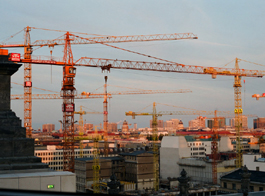
Residential construction in Germany is experiencing a boom, partly due to refugees
 |
German authorities issued permits for 309,000 residential buildings last year. The number of permits rose by 8.4 percent compared to the previous year and surpassed the 300,000 mark for the first time since 2000, statisticians reported.
According to Reuters, many Germans, due to cheap loans, have overcome their traditional aversion to buying their own homes. Some also consider real estate to be an attractive investment.
"Construction activity is heading in the right direction. However, it is still not enough," said Germany's Minister of Construction Barbara Hendricks to Reuters. She noted that not only low-income families but increasingly also families with average incomes are struggling to find affordable housing. "The demand for housing is also being increased by the strong influx of refugees. Therefore, we need at least 350,000 new homes each year," the minister stated.
Even before the intensification of the refugee wave last summer, it was estimated that there was a shortage of about 800,000 affordable apartments in urban areas of Germany. Due to the demand exceeding supply, property prices and rents in large cities, such as Berlin, Hamburg, and Munich, have been rising significantly, reports Reuters.
The German parliament will discuss a government bill on Friday that would provide tax incentives to investors who build apartments in areas where the authorities identify the greatest shortages. These incentives are expected to lead to the construction of up to 100,000 apartments.
The construction sector accounts for about four percent of Germany's gross domestic product and employs around 2.5 million people.
The English translation is powered by AI tool. Switch to Czech to view the original text source.
0 comments
add comment










